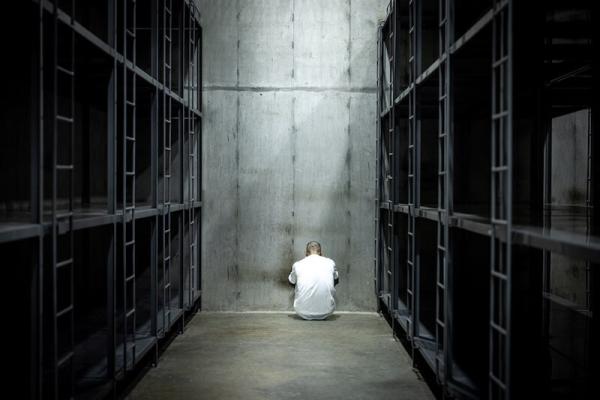“The problem with the meritocracy ... [is that it] leeches all the empathy out of your society.”
The right-wing political commentator Tucker Carlson said that back in 2017 and, by my lights, there’s a kernel of truth there. It almost echoes the early 20th-century sociologist Max Weber’s critique of the Protestant work ethic, how Americans are trained to see wealth as a just reward for living a good life and poverty as punishment for living a bad one; an economic spin on Calvinism. Even if you think Carlson is a reactionary grifter (which I do), I think he’s onto something here.
But more interesting is Carlson’s implication that empathy is a desirable social trait, and its absence a cause for concern. He continued: “The second you think that all your good fortune is a product of your virtue, you become highly judgmental, lacking empathy, totally without self-awareness, arrogant, stupid — I mean all the stuff that our ruling class is.” Again: fair point.
Would the Carlson of today agree that our current ruling class lacks empathy? Considering his praise of President Donald Trump at the 2024 Republican National Convention, I doubt it. More to the point, would Carlson’s ideological cohort think a lack of empathy is a bad thing? Probably not, if people like Joe Rigney are any indication.
Rigney, a fellow of theology at New Saint Andrews College, is one of the men leading a growing number of conservatives who would proudly and explicitly like to see empathy leached from society.
He is the author of The Sin of Empathy, a slender diatribe on how the scourge of empathy has infected American culture, politics, labor, and, most pertinent to his passions, the church. He argues that “[u]ntethered empathy, in tandem with a desire for respectability and credibility under the progressive gaze, is the means by which various aggrieved groups have been able to steer communities into catering to greater and greater folly and injustice” (emphasis mine).
There are two things to note here. The first is that Rigney is careful to qualify his denouncement of empathy as “untethered.” He’s inconsistent on this point — sometimes saying empathy is fine in small doses and only bad when it becomes untethered, other times seeming to think that empathy is always bad, invariably leading to compromise and crisis. “Since empathy entails a suspension of judgment and a more comprehensive sharing of emotion, then the danger of empathy is drowning in the pain and suffering of another,” he writes. “If a sufferer is sinking in quicksand, an empathic helper jumps in after them with both feet,” where they are “overwhelmed by the danger … swept away by the current.” Rigney argues that this untethered empathy leaves people vulnerable to manipulation.
I think this describes a real phenomenon. We have all seen people be taken advantage of because they felt bad for someone else. I’d argue that blaming empathy is an indulgent bit of victim-blaming, and that the solution isn’t to attack the person who is perhaps scammed for being too empathetic but to remain aware that there are manipulative grifters in the world and that we need to stay frosty. If Rigney’s analysis stopped at critiquing how bad actors easily exploit empathy, The Sin of Empathy would be relatively harmless.
But that brings us to the second note: “the progressive gaze,” a phrase Rigney says is his spin on “the white gaze” as used by Black writers. The progressive gaze, Rigney argues, is the universal burden of faithful Christians in the U.S., the harsh spotlight under which every true believer must “live and move and have our being” (his words).
According to him, this progressive gaze pressures Christians who would otherwise be conservative into compromising their ideals, the first step in a slippery slope that leads to more progressive theology and, therefore, ruin. For example, he writes — and I am not making this up — that questioning complementarianism is a one-way train ride that starts at “I’m Not That Kind of Complementarian” and ends at “Sodomy is Cool.” Rigney does not seem to think any Christian with progressive views on egalitarianism or LGBTQ+ inclusion comes by those opinions honestly.
The progressive gaze, even more than empathy, is the book’s true villain, “the greatest threat to Christian faithfulness.” The back cover reads: “We must get out from under the progressive gaze,” a gaze that Rigney believes we can only escape by cleansing ourselves of untethered empathy. Because to Rigney, untethered empathy only ever goads sympathies toward the wrong side of the culture wars.
Throughout the book, parents are chided for feeling too much empathy for transgender kids dealing with suicidal ideation, voters are criticized for feeling too much empathy for a teen mother who couldn’t get an abortion after being raped by her stepfather, and employers are attacked for feeling too much empathy for employees highlighting concerns about discrimination. You can see the culture war tilt here.
If Rigney thinks there’s a problem with feeling empathy for, say, aggrieved white men who can’t land a date in today’s world of “woke” dating apps, he doesn’t address it. For Rigney, empathy for the political Left is dangerous. Empathy for people like him and others on the Right is unaddressed. And so one wonders if empathy is his real issue or if his real issue is people standing athwart his conservative ideals.
This becomes clearer in the proper book’s latter half, where Rigney largely dispenses with even the pretext of criticizing empathy and instead moves on to more standard right-wing bugaboos like trans athletes, cancel culture, anti-racism, and, above all, feminism — which is pitched as the main boss of all social ills because, in Rigney’s view, “women are more empathic than men,” you see.
This, according to him, is why women shouldn’t be leaders in the church, where their “God-given” impulse to “move toward the hurting with comfort and welcome becomes a major liability when it comes to guarding the doctrine and worship of the church.”
He proceeds to fall out of the misogyny tree and hit every branch on the way down, contrasting stereotypically feminine relational dynamics (“indirect and subtle communication,” “sublimated conflict,” “averse to open disagreement and overt hierarchies while being comfortable with excluding those who violate their social norms”) with the apparently superior masculine dynamics. There is no need to recap his whole tired “women be empathizin’” rant here, but suffice it to say, it seems clear that Rigney believes that insofar as empathy is a sin, women are the sinners.
As you can probably tell, I did not find Rigney’s argument persuasive. I doubt I was ever the intended audience for his book, as his writing seems to assume complementarian theology and non-affirming views toward LGBTQ+ people among his readership. But among ascendant voices on the Right, he’s found a lot of purchase.
Blaze TV’s Allie Beth Stuckey wrote Toxic Empathy,which has a similar message geared toward women, and that hit The New York Times bestseller list. Albert Mohler, the longtime president of Southern Theological Seminary, criticized empathy in an interview with The New Yorker’s Isaac Chotiner, calling it an “artificial virtue” that is being “used politically in ways that are very destructive and manipulative.” Elon Musk, who is a billionaire and chief of the Department of Government Efficiency, went on the Joe Rogan podcast to explain why empathy is “the fundamental weakness of Western civilization.”
I’m not quite conspiratorial enough to think someone is coordinating a full-scale assault on empathy, but if they were, this is how you’d do it.
One unifying theme from all these voices is that empathy means sacrificing your own moral compass for the sake of feeling bad for other people. Or, as Mohler put it in his interview: “Empathy” is a “therapeutic virtue” that “means never having to say no.” This, to me, is nonsense.
It is nonsense because any healthy conversation about empathy also revolves around boundaries. Author Brené Brown, who Rigney highlights as one of the chief architects of empathy in modern society, writes in her Dare to Lead that “boundaries are important here. We have to know where we end and others begin if we really want to show up with empathy.” Rigney himself cites this Brown quote in one of his footnotes, writing that her point is “well-taken” but “seems to jar” with the rest of her writing about empathy. The possibility that he has misunderstood or created a straw man out of her definition of empathy to serve his own crusade against the progressive gaze does not apparently enter his thinking.
But it should. Contrary to these arguments, I do not think most empathetic people see empathy as jumping in after the drowning with both feet, sacrificing all morals and personhood in the process. And if they do, I think any good therapist or smart friend would tell them otherwise. At its best, empathy is a form of humility. To be empathetic is to admit the limitations of your own experience and the fallibility of your own judgment.
It is what Paul is getting at in Philippians 2, when he encourages the church to “in humility regard others as better than yourselves. Let each of you look not to your own interests, but to the interests of others” (verses 3-4). Notably, he then instructs believers in verses 5-7a to “Let the same mind be in you that was in Christ Jesus,
Who, being in very nature God,
did not consider equality with God something to be used to his own advantage;
rather, he made himself nothing
by taking the very nature of a servant[.]”
Empathy is a squishy word, but the New Testament’s encouragement here seems like its purest expression — a way to stop seeing ourselves as the protagonists of everyone else’s experience and, instead, as their servant.
As we see in the example of Jesus, this means far more than just material generosity (although it certainly means that too). It also means our posture, attitude, and very identity ought to be one of identification with the hurting. We are, in our own small, human way, imitating the very incarnation of Jesus.
And this, I think, is what Rigney, Musk, and all the other empathy critics truly fear: ceding power. Because empathy requires that we flatten hierarchies and surrender whatever authority we think we have over other people’s experiences. Rigney is not wrong that an attitude this radical carries some risk. But such is the way of the love of God. It may lead you to sacrifice. But it will also lead you to resurrection.
Got something to say about what you're reading? We value your feedback!







